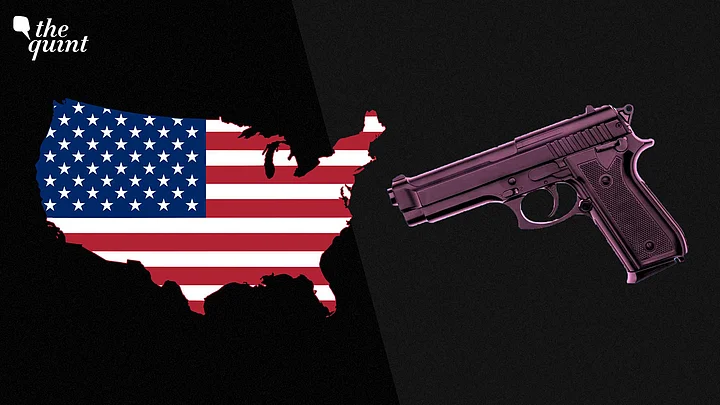Guns and gun laws are a polarising issue in the United States (US).
The debate around the freedom of US citizens to bear and use arms is likely to get even more heated after the horrific shooting that occurred in a Brooklyn subway station in New York City on 12 April.
Twenty-three were injured in the attack, while the possibility of involvement of a suspect, 62-year-old Frank James, is being looked into.
What is it about the gun laws in the US that makes them so controversial? What is the debate around them?
Guns, Lots of Guns
Here's a shocking statistic: The US had 120.5 guns per 100 residents in 2017, according to Small Arms Survey, an independent research project that researches small arms.
More guns than people.
Here are some other statistics. The US has less than 5 percent of the earth's population but more than 46 percent of civilian-owned guns, according to a 2018 report by Small Arms Survey.
In terms of firearms per capita, the US is ranked first in the world.
Such a situation is possible mostly because of the Second Amendment to the US Constitution. It reads:
"A well regulated Militia, being necessary to the security of a free State, the right of the people to keep and bear Arms, shall not be infringed."
There have always been diverging opinions about what "a well regulated militia" means. What constitutes a militia? And what constitutes a "people"?
That question was made partly irrelevant when the Supreme Court of the US gave a landmark decision in District of Columbia v. Heller (2008), in which it stated that the Second Amendment gave every individual the right to keep and bear arms, even if they are not connected with service in a militia.
"There seems to us no doubt, on the basis of both text and history, that the Second Amendment conferred an individual right to keep and bear arms," wrote Justice Antonin Scalia in his majority opinion.
This does not mean that everyone can own guns.
The Gun Control Act of 1968 (GCA), requires that citizens and legal residents must be at least 18 years of age in order to buy guns.
Additionally, convicts, "illegal aliens," and the "mentally defective" are not permitted to own firearms.
Gun laws can differ by state because each state's constitution gives it the power to prescribe its own gun laws. But the laws for most states are pretty much identical to each other and they read similar to the Second Amendment.
California, Maryland, Minnesota, New Jersey, and New York are some of the states that have tough laws on gun control.
The Debate Around Gun Control
The debate around gun control revolves around factors like the interpretation of the Second Amendment, the connection of gun ownership with crime, and the right to self-defence, among others.
In a Gallup survey conducted in 2019, most gun owners said that they owned a firearm for personal safety.
Opponents, however, say that gun control laws would reduce gun-related crime.
A 2016 Lancet study has shown that gun licensing laws were associated with a 14 percent decrease in firearm homicides, while increases in the same were seen in areas with more lenient laws.
Those in support of guns cite the Second Amendment and the 2008 judgment, while opponents argue that the Second Amendment is subject to limitations.
Interestingly, Justice Scalia, in the aforementioned judgment of 2008, had also written:
"Like most rights, the right secured by the Second Amendment is not unlimited… nothing in our opinion should be taken to cast doubt on longstanding prohibitions on the possession of firearms by felons and the mentally ill, or laws forbidding the carrying of firearms in sensitive places such as schools and government buildings."
Proponents of laws that give wider access to firearms say that they are essential means of self-defence. Opponents argue that guns are rarely used for self-defence.
According to a May 2013 study, of the 29,618,300 violent crimes committed in the US between 2007 and 2011, 0.79 percent of the victims used a firearm or threatened to use a firearm to protect themselves.
It was also "the least-employed protective behaviour."
Division of Opinion
Opinions on guns and gun laws are polarising based on a lot of factors such as race, urban-rural divide, and political ideologies and affiliations.
According to the research conducted by Pew, about 82 percent of Black adults say that gun violence is a big problem.
Contrastingly, around 58 percent of Hispanic adults and 39 percent of White adults think the same.
Americans in rural areas typically want unrestricted access to guns while Americans in urban areas prefer more restrictive policies.
Additionally, the Democrats and Democrat-leaning people are more likely to view unrestricted gun access as a problem compared to the Republicans and supporters of the Republican Party.
(At The Quint, we question everything. Play an active role in shaping our journalism by becoming a member today.)
